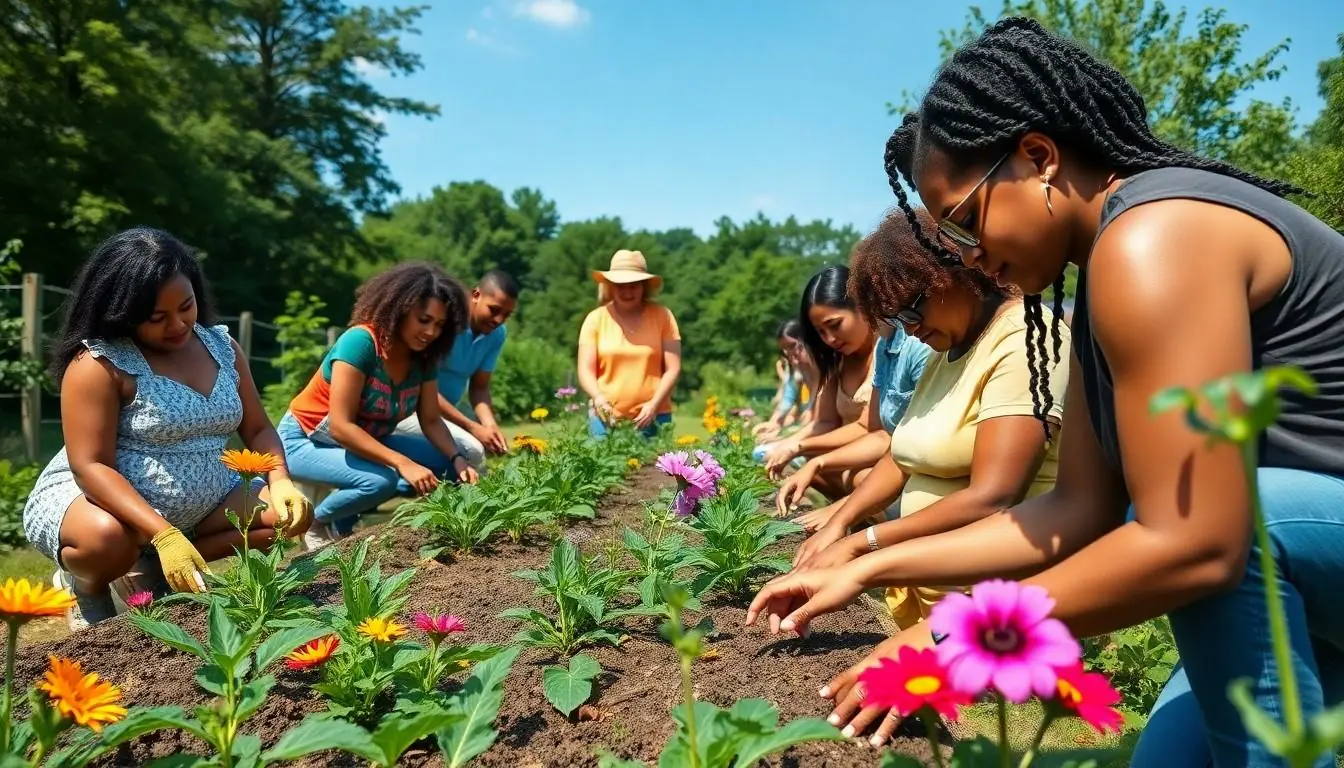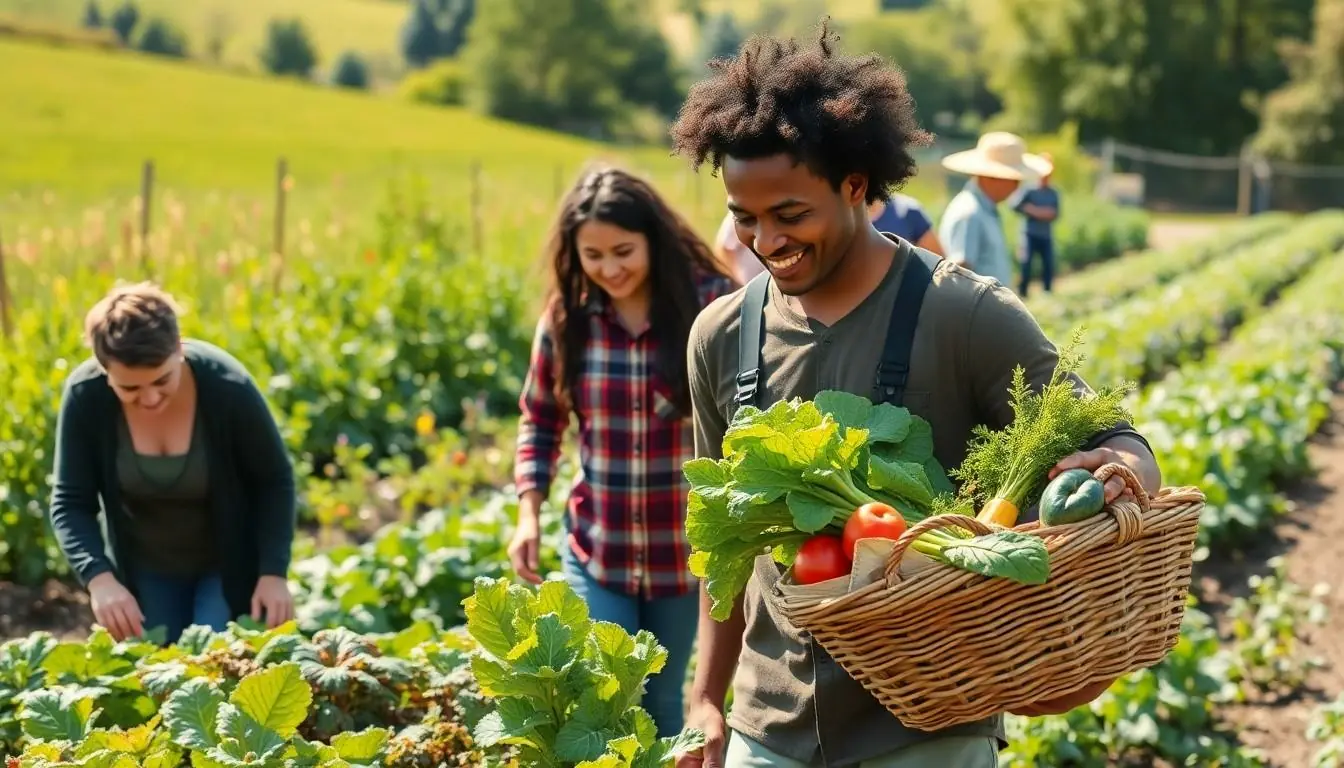Table of Contents
ToggleIn the heart of horse country, Kentucky is more than just bluegrass and bourbon; it’s a treasure trove of sustainable living opportunities. Imagine sipping your locally brewed ale while surrounded by lush landscapes and thriving farms that practice eco-friendly techniques. It’s not just a dream—it’s the new Kentucky lifestyle, where residents are embracing sustainability like a Southern grandma hugs her sweet tea.
Overview of Kentucky Sustainable Living
Kentucky stands out as a leader in sustainable living through its diverse initiatives. Residents actively cultivate organic gardens, supporting local economies and promoting environmental stewardship. Farmers’ markets flourish across the state, providing public access to fresh, locally sourced produce.
Sustainable farming practices drive agriculture in Kentucky, with numerous farms embracing regenerative methods. These approaches restore soil health, reduce chemical usage, and enhance biodiversity. Many Kentuckians prioritize native plant landscaping, which conserves water and supports local wildlife.
Energy efficiency plays a significant role in Kentucky’s sustainable lifestyle. Many households adopt solar panels, reducing reliance on fossil fuels. Through state programs, residents receive incentives for upgrading homes with energy-efficient appliances.
Education also contributes to the movement. Kentucky universities develop research programs focused on sustainability, equipping the next generation with knowledge and practical skills. Community workshops often teach practical skills, from composting to rainwater harvesting.
Additionally, recreational activities emphasize environmental consciousness. Hiking, biking, and kayaking encourage appreciation of Kentucky’s natural beauty while promoting eco-friendly transportation options.
These collective efforts represent a strong commitment to sustainability, positioning Kentucky as a model for eco-conscious living in the United States. Engaging in these practices not only enhances the quality of life but also fosters a community dedicated to preserving the environment for future generations.
Key Principles of Sustainable Living

Sustainable living in Kentucky revolves around core principles that guide residents toward responsible choices. Environmental stewardship and social responsibility stand out as key components of this eco-conscious lifestyle.
Environmental Stewardship
Kentuckians actively practice environmental stewardship through initiatives such as organic gardening and native plant landscaping. These practices enhance biodiversity and conserve precious water resources. Reducing chemical usage in agriculture promotes healthier ecosystems. Many communities celebrate farmers’ markets, connecting residents with fresh, locally sourced produce. Conservation efforts benefit wildlife, as native plants provide essential habitat. Education plays a crucial role, as local workshops teach skills like composting and rainwater harvesting. Participants gain hands-on experience, fostering a deeper understanding of sustainable practices. Strategies such as energy-efficient upgrades in households further demonstrate commitment to ecological responsibility.
Social Responsibility
Social responsibility thrives in Kentucky’s sustainable living culture, encouraging ethical practices among residents. Community support for local businesses strengthens the economy while promoting environmentally friendly products. Many organizations advocate for social justice and equality, ensuring access to sustainable resources for all. Volunteers participate in community clean-up events, reflecting a shared commitment to enhancing local environments. Collaborative spaces, such as community gardens, foster connections among residents and provide opportunities for learning. Educational programs at universities emphasize sustainability research, significantly influencing future leaders. Overall, social responsibility integrates seamlessly with environmental efforts, reinforcing a unified approach to sustainable living.
Sustainable Agriculture in Kentucky
Sustainable agriculture thrives in Kentucky, showcasing eco-friendly practices that benefit the environment and local economy. The state exemplifies commitment to sustainability through various farming initiatives.
Organic Farming Practices
Organic farming practices dominate the landscape, enhancing soil health and biodiversity. Many farmers utilize methods like crop rotation, cover cropping, and reduced tillage. These techniques minimize chemical usage while promoting natural pest control. Certification programs, such as USDA Organic, encourage adherence to organic standards, supporting farmers in transitioning to sustainable practices. Educational resources from local universities help farmers understand organic practices, improving learning opportunities in the agricultural community.
Local Food Systems
Local food systems gain traction, providing communities access to fresh produce. Farmers’ markets flourish across the state, connecting consumers directly with local growers. These markets offer a variety of seasonal fruits, vegetables, and artisanal products, fostering a sense of community. Supporting local farmers enhances the economy while reducing carbon footprints associated with food transportation. Initiatives like farm-to-table programs strengthen partnerships between restaurants and farms, promoting sustainable and nutritious dining options.
Renewable Energy Initiatives
Kentucky actively pursues renewable energy initiatives, showcasing its commitment to sustainability. Residents embrace various energy sources to enhance overall efficiency and reduce environmental impact.
Solar Power Adoption
Solar power adoption rises among Kentucky households, supported by state incentives that promote energy-efficient upgrades. The availability of rebates and tax credits encourages residents to install solar panels, resulting in lower electricity costs and reduced reliance on fossil fuels. Communities engage in educational programs that inform residents about solar technology’s benefits, while local companies offer competitive installation services. By harnessing ample sunlight, Kentucky maximizes solar energy potential, contributing to a cleaner environment and promoting energy independence.
Wind Energy Projects
Wind energy projects flourish across Kentucky, with numerous sites dedicated to harnessing wind power. Developers have established wind farms in regions with suitable wind conditions, significantly increasing the state’s renewable energy output. By utilizing large turbines to capture wind energy, these projects help reduce greenhouse gas emissions and promote sustainability. Collaboration among government agencies, environmental organizations, and private investors drives advancements in wind technology, positioning Kentucky as a growing leader in renewable energy. Through these initiatives, communities support economic growth and environmental preservation, capitalizing on a sustainable future.
Community Engagement in Sustainability
Community engagement plays a vital role in Kentucky’s sustainable living movement. Local residents participate in various initiatives and support organizations focused on environmental stewardship and social responsibility.
Local Organizations and Initiatives
Numerous organizations in Kentucky champion sustainability efforts. The Kentucky Sustainable Agriculture Working Group promotes eco-friendly farming practices and helps farmers transition to sustainable methods. Local chapters of the Sierra Club coordinate clean-up events, educating participants about the importance of preserving natural habitats. Additionally, non-profits like Green Building Kentucky advocate for energy-efficient construction and renovation practices. Each group contributes uniquely to the overall mission of fostering environmentally friendly communities.
Educational Programs and Workshops
Engaging educational programs enrich Kentucky’s sustainability efforts significantly. Many universities offer courses related to sustainable practices, helping students develop knowledge in environmental sciences. Community workshops focus on practical skills such as composting, rainwater harvesting, and organic gardening techniques. Organizations like UK Cooperative Extension Service facilitate hands-on learning experiences that empower residents to implement sustainable practices at home. Each program emphasizes the importance of community involvement in sustainable living while providing resources for continued education.
Kentucky’s commitment to sustainable living is evident in its vibrant communities and eco-friendly practices. Residents are embracing a lifestyle that prioritizes environmental stewardship through local farming and renewable energy initiatives. The state’s rich natural resources and supportive programs foster a culture of sustainability that not only benefits the environment but also strengthens local economies.
As Kentuckians continue to engage in sustainable practices and community efforts, they set a powerful example for others to follow. This collective dedication to preserving the land and promoting eco-conscious living ensures that future generations will inherit a healthier and more sustainable Kentucky.






